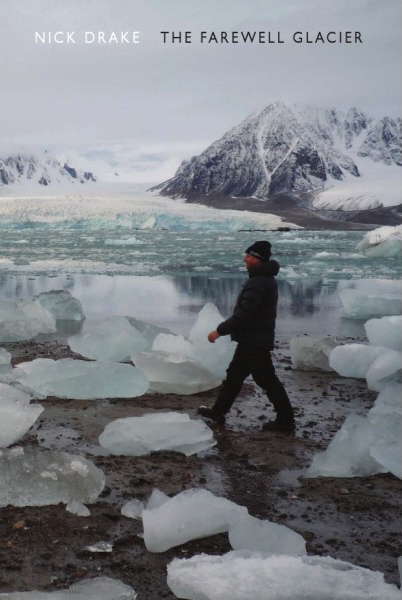The Farewell Glacier by Nick Drake – Carl Griffin reviews the latest poetry collection from Nick Drake, a series of poems dedicated to a vanishing world.
In 2010, Nick Drake, one of the Next Generation poets selected in 2004, sailed around Svalbad, a Scandinavian archipelago of islands, accompanying Cape Farewell, the arts climate change organization. The journey prompted the poems which make up The Farewell Glacier. It might sound like the start of Ian McEwan’s novel Solar, minus the hilarious mishaps, but this collection braves the cold throughout and, rather than focusing on Drake’s own experience, which may have made for a better collection, tells the tales of other travellers. The whole focus is on the Arctic and that is where The Farewell Glacier draws its power, making it simultaneously both claustrophobic and an adventurer’s utopia.

by Nick Drake
64pp, Bloodaxe, £8.95
The poems aren’t titled but each poem is voiced by a historical explorer (specified at the back of the book), in the form of letters home or personal diaries, and it’s an effort to work out where one voice ends and another begins. Whether the poems add much to the bios of the poets included at the rear of the book is questionable. At times it seems as if Drake is scraping the barrel, using every tidbit of information garnered from his research, and you can often feel you are browsing through Wikipedia, second-hand. Indeed, in conclusion to a tribute for Ootah, an Inuit guide, we are told ‘You can Google it’. But the concept of this collection is thrilling and, if you are willing to make an effort, to join in, immerse yourself, you can lose yourself in the journey.
Pytheus the Greek, the first person to describe the midnight sun and polar ice, kicks off proceedings:
Theophrastus says time
Is an accident of motion
And surely what he says is true;
For we came to a place where the sun did not set,
And the ocean stopped,
And the waters congealed,
And the gnomon of our mast
Cast a shadow that reached to the horizon.
Although the voyage was undertaken in the fourth century BC, the image itself isn’t dated. In the freezing depths of the world where humans never, or rarely, travel, we can imagine the sun never setting, an ocean stopping. And this is where The Farewell Glacier makes your spine shiver. A lack of sunlight dwells heavily and gloomily on this collection, whether the location is the North Pole or Greenland, and stirs the silence for Saint Brendan of Clonfert, in the Isles of the Blessed, where ‘no man aged/for the sun held still in the sky,’ William Parry, a merchant and explorer, continues the theme:
But all around us was the gloom
In which we took our walks
In darkness and deathlike silence
So different from the peaceable composure
Of a cultivated country;
We heard each other singing
A mile and more away.
At times you might wonder what the point is of travelling to this much desolation. As Fritjof Nansen, a Norwegian scientist, complains in frustration during his expedition, ‘Shall I have nothing to write about/when I get home?’ But to be where ‘time is passing to no purpose’ was surely part of the allure for all these adventurers.
The second half of the book sees an introduction to the scientific aspects of the Artic, such as methane and the ice-core sample, the latter of which is drilled from ice-sheets of glaciers, providing a climatic record of atmospheric composition going back hundreds of thousands of years. In the final section the sun becomes a warning and the poetry, in places, becomes preachy, condescending. Drake sums up the inevitable doomsday best with a question:
And when we return to our warm living rooms
Where we live like gods on borrowed time,
How shall we recall this frozen auditorium
And its oracular silence,
And the last, long performance
Of its disappearing act?
The subject of climate change might not grab your attention, but with its footprints on the polar highs and two spoons of iceberg The Farewell Glacier will melt the hardest heart.










